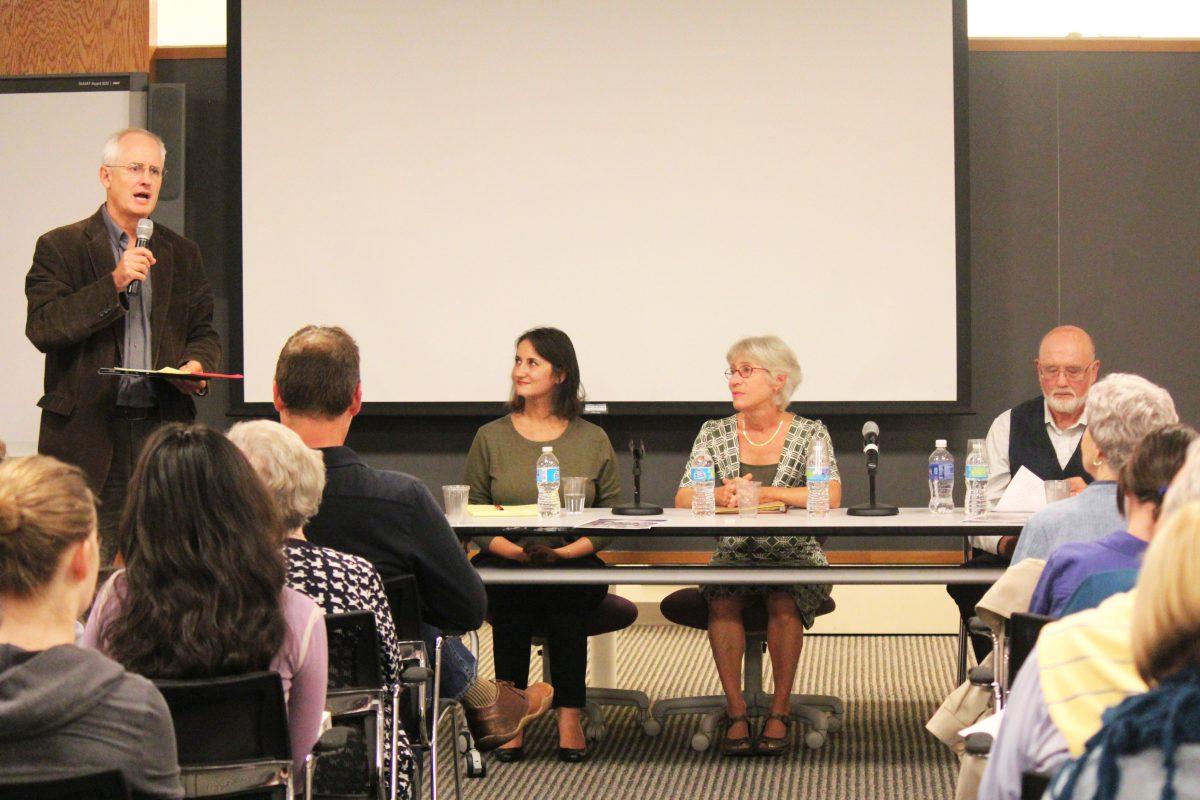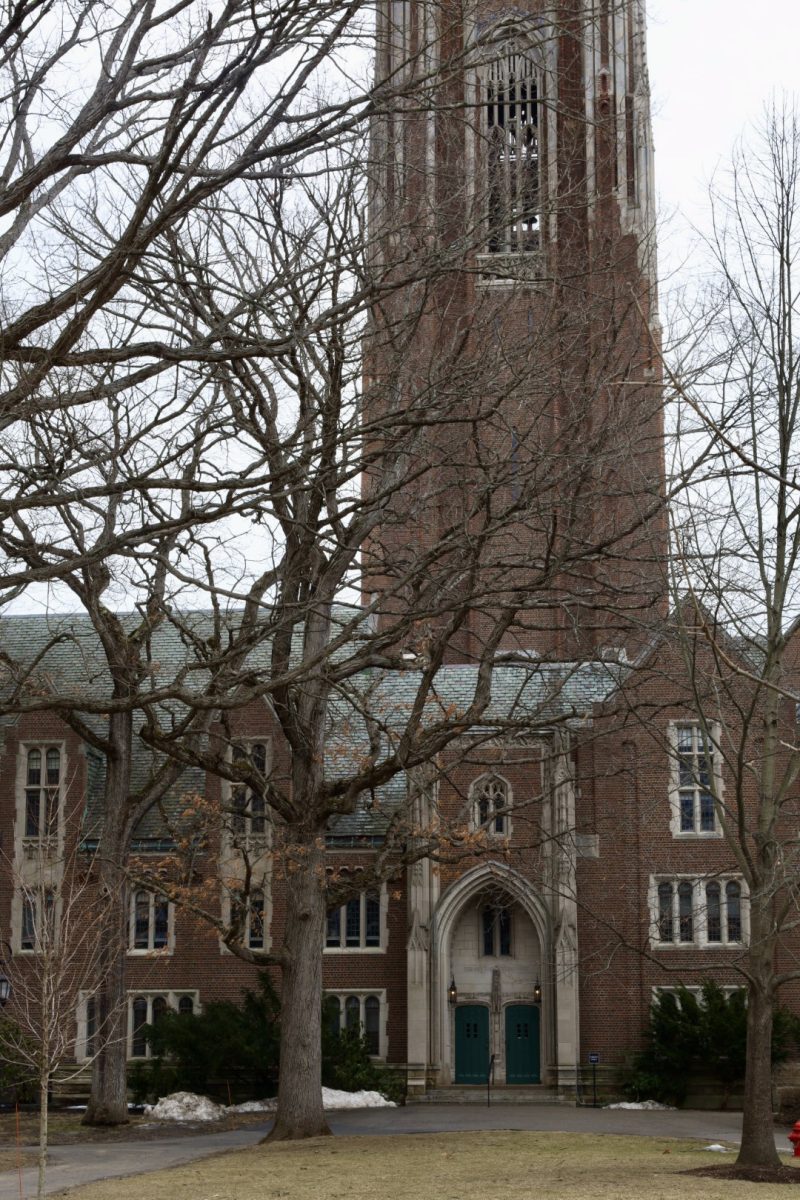Pressing foreign issues draw large crowds to panel
The Russian Area Studies Department hosted an event at Clapp Library on Wednesday to answer crucial questions regarding Russia’s recent political actions and motivations. Russia NOW!: The Current State of the Former Soviet Union featured presentations from Anthropology Professor Philip Kohl, History Professor Nina Tumarkin and Nadiya Kravets of the Harvard Ukrainian Research Institute. The panelists then answered the audience’s questions, moderated by Russian Professor Thomas Hodge.
After the Ukraine’s revolution last winter, its Parliament replaced Viktor Yanukovych with Petro Poroshenko as president. Crimea, a southeastern coastal region of Ukraine, pushed to secede from Ukraine to join Russia. Russian soldiers entered the region to quell violence at Yanukovych’s request. In March, Crimea joined Russia after a referendum whose legitimacy is contested by the international community. The Donetsk and Luhansk regions of eastern Ukraine have since been embroiled in conflict between Poroshenko’s government and pro-secession rebels. The tragic Flight MH-17 crash in Ukrainian airspace raised questions about Russia’s involvement in the conflict. A ceasefire was enacted on Sept. 5.
 Taking these events into account, it is no surprise that Tumarkin underscored Russia’s presence on the world stage.
Taking these events into account, it is no surprise that Tumarkin underscored Russia’s presence on the world stage.
“Not since before the fall of communism has Russia been so dominant in global affairs as she is today,” Tumarkin said. One notable trend in the country is the increasingly authoritarian nature of the Kremlin.
“[Russian President Vladimir] Putin has made it all but impossible for change to be brought about by elections. He’s made it all but impossible to replace him,” Tumarkin said, adding that his strategy has been to divide his political enemies and cut them off from available resources.
Despite questionable tactics, Putin still has high approval ratings and a comfortable grasp on the presidency due to effective state propaganda, notes Tumarkin. She added that his popularity is also due to his adept manipulation of Eurasianism, a dominant strand of Russian nationalism that distinguishes the Russians by their unique geographic location and relationship with the nomadic Turkish-language-speaking peoples from the Eurasian steppes. According to Kohl, the concept only began gaining traction near the end of the Cold War during Soviet Leader Mikhail Gorbachev’s term, despite its usage in 19th century Russian literature and letters.
According to the panelists, Russia’s renewed sense of nationalism, need for self-preservation and desire to fill the security vacuum in Eastern Europe all contributed to the country’s decision to annex Crimea, an action which shocked many Russia area experts.
“We didn’t think Russia would throw away the legal regime it had bound itself to,” Kravets said.
The panelists also underscored the increased tension in Russian-American relations. Although the United States has not intervened in Ukraine, it supports the EU’s stringent economic sanctions on Russia and has thus alienated the Kremlin.
Kohl maintains that the United States and Russia can cooperate on international issues like the growth of the Islamic State group in Iraq. However, he insists that the United States must alter how it perceives Russia.
“Are we to proceed as if the Cold War still exists, still blaming the other for all our problems?” Kohl challenged.
The other panelists concurred with Kohl, noting that Russian-American relations have evolved from 20 years ago. Friction between the countries is due to the countries’ diverging value systems rather than the economic differences of the past, maintain the panelists. The panelists also remarked that since the fall of Communism, the United States has remained dominant while Russia has had the markings of a decaying empire.
“Russia is a revisionist power of the 19th century kind, one that wants to rewrite its own laws. We are going to see the new regime it is trying to establish,” Kravets said.
The sobering event began on a rather humorous note.
“Right now I think we should thank Vladimir Putin for helping us obtain this very large audience,” Kohl said, eliciting laughter from the approximately 150 students, faculty and Wellesley residents listening.
Kohl’s quip raises the question of why so many attended the event.
Many students pointed to Russia’s recent actions in the Ukraine and Crimea.
“I think Russian affairs will be important for the future and are very relevant now so I want to hear more about it and get a clearer picture of what’s going on,” Elizabeth Kysel ’18 said.
Some students simply desired a more balanced perspective on the Ukraine crisis.
“I am very interested in learning the American point of view about the situation since I am used to the European point of view,” French exchange student Pauline Negrin ’16 said.
Tumarkin called for a new generation of American experts on Russia to help craft a foreign policy for the future. She hopes that Russia NOW! will inspire Wellesley students to consider an international relations career concentrated on Russia, particularly at a time when the country’s unpredictable behavior is transforming Eastern Europe into a more volatile part of the world.






